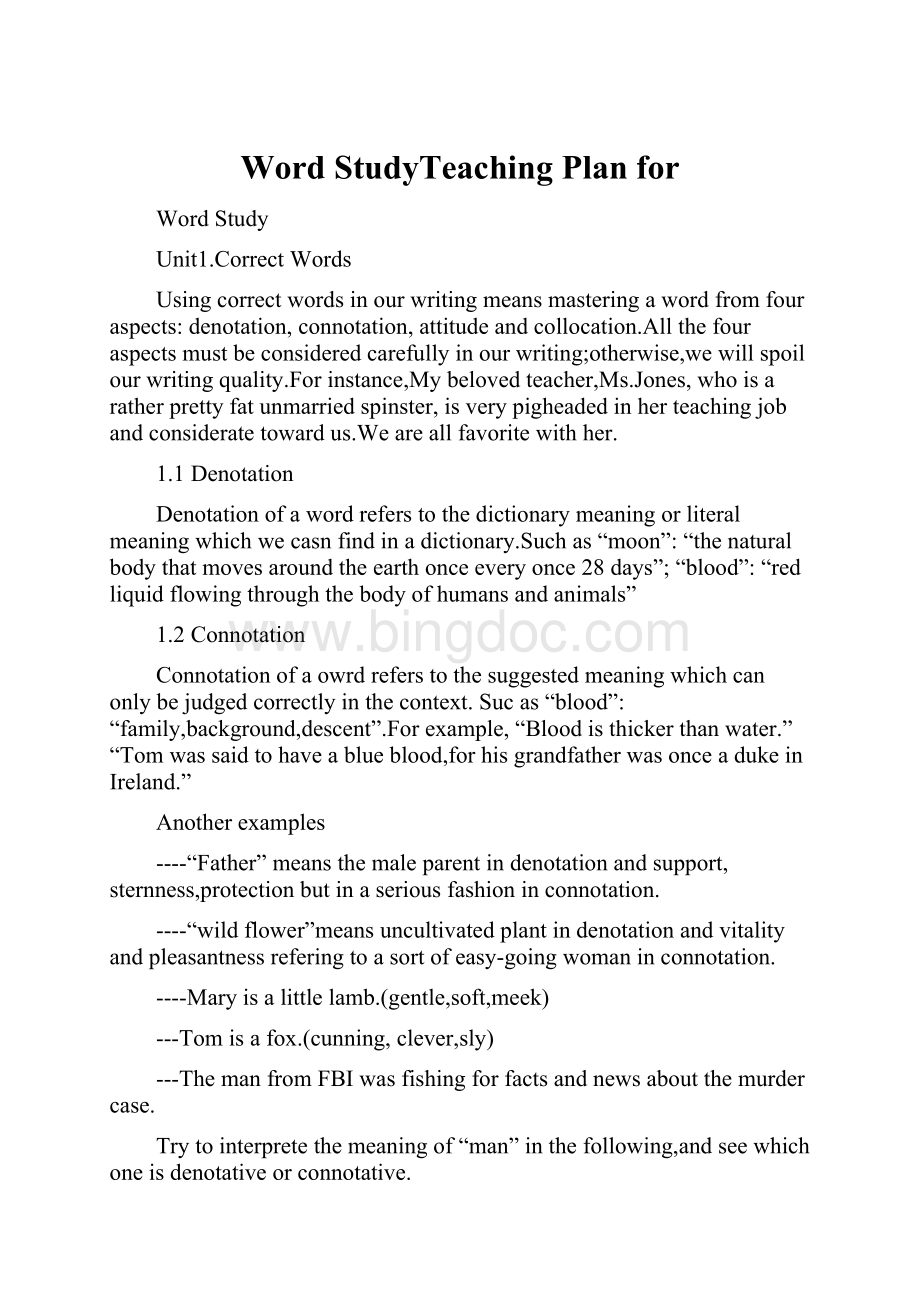Word StudyTeaching Plan forWord文档格式.docx
《Word StudyTeaching Plan forWord文档格式.docx》由会员分享,可在线阅读,更多相关《Word StudyTeaching Plan forWord文档格式.docx(16页珍藏版)》请在冰点文库上搜索。

----“wildflower”meansuncultivatedplantindenotationandvitalityandpleasantnessreferingtoasortofeasy-goingwomaninconnotation.
----Maryisalittlelamb.(gentle,soft,meek)
---Tomisafox.(cunning,clever,sly)
---ThemanfromFBIwasfishingforfactsandnewsaboutthemurdercase.
Trytointerpretethemeaningof“man”inthefollowing,andseewhichoneisdenotativeorconnotative.
---Theboytriedtobeamanandnottocrywhenhiswoundwasdressed.
---ManisrapidlydestroyingtheEarth.
---“What’sthesmell?
”Iaskedthemanbesidemeinthebus.
---“Man,gotamatch?
”Anobviuoslydrunkbeggarstoppedmeatthestreetcorner.
1.3Attitude
InEnglish,somewordshaveaffectivemeanings,whichconveytheuser’sattitudetowardsthereferentsofthewords.Thesewordsfallintotwotypes:
appreciativewordsandderogatorywords.
-----Appreciativewordsareusedtoshowtheuser’spositiveattitudeslikeaffection,admiration,appreciationandapproval.
-----Derogatorywordsareusedtoshowtheuser’snegativeattitudeslikedislike,disapproval,contempt,andcriticism.
Thedifferenttypesofwordsusuallyembracethesamemeaningbutdifferentattitude,thereforeinwriting,emotionalwordsshouldbecarefullyusedincaseofmakingadictionerror,andgettinganoppositeexpression,forwordscanrevealthewriter’sattitude.
----Appreciativewordstoshowone’spositiveemotionareasfollows:
commendatory,complimentary,admiring,applauding,approving,friendly,positive;
appreciative,respectful;
kindhearted,kindly,sympathetic,warm,warmhearted.
-----Derogatorywordsfrequentlyusedtoexpressone’snegativeemotionareasfollows:
slanderous,despiteful,hateful,malicious,malignant,spiteful,resentful,critical,jealous,belittling,contemptuous,deprecatory,depreciative,derogative,disdainful,scornful.
ComparisonofEmotionalWords
Appreciativewords
Neutralwords
Derogatorywords
unique
strange
bizarre
steadfast
stubborn
pigheaded
compliment
praise
flatter
bachelorgirl
singlewoman
spinster
plump
fat
obese
slim
thin
skinny
1.4Collocation
Collocationisthewayinwhichwordsareusedtogrtherregularly.Itreferstotherestrictionsonhowwordscanbeusedtogether,i.e.whichprepositionsareusedwithparticularverbs,orwhichverbsandnounsareusedtogether.Collocationsarethewordsthattendtoco-occurinalanguage—ingrammaticalpatterns,compoundsorfixedphrases.Forexample,inEnglishtheverb“perform”isusedwith“operation”,butnotwith“discussion”.Thuswecansay:
“Thedoctorperformedtheoperationwhilethecommitteewasholdingadiscussion.”
CollocationsarealsokindsofidiomsinEnglish,forcollocationsandidiomsbothbelongtolexicalchunks,whichareveryimportantinEnglishlearning.
----Collocatingtypes:
(1)V+N:
followthefashion;
(2)Adj+N:
abrilliantsuccess;
(3)V+Adv:
thinkalike;
(4)Prep+N:
thekeytothequestion;
(5)V+Prep:
thinkofanidea.
----Idiomtypes:
Anidiomismulti-wordexpressionwhichfunctionsasasingleunitandwhosemeaningcannotbeworkedoutfromthesumofitsseparateparts.
Suchas“Shewashedherhandsofthematter.(Sherefusedtohaveanythingmoretodowiththematter.)”
Hespilledthebeens.(Hetoldsomeonesomethingthatpeoplehavebeentryingtokeepsecret.)
HeseemslikeadecentblokeandI’vegotnoaxistogrindwithhim.(Idon’tgetalongwithhimwell.)
----Moreexamplesforcollocations
a.holdone’stongue
b.behindcloseddoors
c.aslapintheface
d.abitterpilltoswallow
e.throwcoldwateron
f.seered
g.putone’seggsinonebasket
h.oncloudnine
i.throughthickandthin
----Trytointerpretethefollowingads
a.Usecautionwhenwet.
b.Watchyourhead.
c.Loseyoursuitnotyourstatus.
d.Shutdownyourcomputer.Restartafriendship.
1.5FalseFriends(SeePp.6-7)
Whydowemakefalsefriends?
Becausewedonothavemuchknowledgeaboutthepersonwhowewanttocontactwith.InEnglish,itisthesamewithourchoosingwordsforourwriting.Sometimes,wearenotawareofmakingfalsefriendswhenweindeedhavechosenawrongcollocationofthewords.Forinstance,“Myfavoriteistotakephotoesandfriendsinthewild,forthepleasantfriendshipandbeautifulscenescanimprovemyinterpersonalrelations.”
Falsefriendscanbelistedasfollows:
a.Homonym(同音异义词)
--ground:
theplaceunderthefeet/thepastparticiple:
grind=ground:
makeintopiecesbypressingbetweentwohardthings.
--sow:
toplantorscatterseedsinthefields/sow:
femalepig.
--provided:
p.p.thepasttenseoftheverb“provide”/conj.ifandonlyif,onconditionthat….
---concerning:
p.p.thepresenttenseofverb“concern’/pre.about,withregardto
Canyouthinkupmoreofthehomonyms?
ThefollowingarelinguisticwonderscreatedbyHomonym
----“Mineisalongandsadtale!
”saidtheMouse,turningtoAlice,andsighing.
“Itisalongtail,certainly,”saidAlice,lookingdownwithwonderattheMouse’stail;
“Butwhydoyoucallitsad?
”(fromAlice’sAdventuresinWonderland)
----Moresunandairforyoursonandheir(ads)
---趁早下“斑”,请勿“痘”留。
---“闲”妻良母
---以“帽”取人
---“义”“名”惊人(短跑运动员劳义获广州亚运会百米冠军后的新闻报道)
b.Polysemy(一词多义)
--board:
apieceofsawnwood;
astiffpaneloverwhichthepaperisstretchedtoformthesideofaboundbook;
acouncilorauthoritativebody;
dailymealsservedinexchangeforpaymentorservices;
asquareoroblongpieceofthinwoodforspecialpurpose,divingboard,soundingboard.
--heart:
theorganofthebodywhichpumpsbloodinthesystem;
thecentralpartofsomething;
themostimportantpartofsomething;
centeroftheemotions,love,kind.
Moreexamples
---Shecannotbearchildren.---TheRabbimarriedmysister.---ThomasJeffersonatehiscottagecheesewithrelish.---ThegirlfoundabookonMainStreet.
c.Hyponymy(下位关系词)andHypernymyorSuperordinate(上位关系词)
---fruit---blackberry---berry---berryjuice
---spaniel—dog---puppy
Forinstance,“Inthecorruptofficial’shouse,thepolicemensearchedoutatleastfiveluxurycars,suchasBenz,Volve,Bettle,andothervehicles.”
Moreexample:
Trytoidentifytherelationshipofthefollowingwords,andclassifythemaccordingtoHyponymyandHypernymy.
Animal,ant,bee,oak,cucumber,cockroach,creature,chrysanthemum,pig,flower,zebra,
insect,livingthings,willow,plant,snake,tree,vegetable,cabbage,carrot.
Animal
Catdogpighorsecowbear
stallionmarefoal
Unit2.AppropriateWords
Appropriatewordsaredeterminedinawritingcontext.Thesamewordmaybeinterpreteddifferentlyinthedifferentcontext.Thewordyouthinkisappropriateusedinherebutdefinitelynotinthere.Thedeterminingfactorsofusingawordappropriatelydependsonthewritingcontextaboutaudience,purpose,styleandcommunicatingformat.
2.1Style
2.1.1Colloquialwords
Colloquialwordsarecertainlyusedindailyconversation,whenusedinwriting,theycanobviuoslyachieveaconversationaleffect.Colloquialwordsarecharacterizedbyusingcontractions.e.g.,don’t,didn’t,won’t,hasn’t,haven’t,orbyabbreviations,e.g.,auto,phone,photo,disk,lab,kilo,exam,fridge,flu,expo,pro,memo,taxi,dept,motel,mike,telly,jet,pub,three-D,orbyacronyms,e.g.,NPC(NationalPeople’sCongress),FBI(FederalBureauofInvestigation),GMT(GreenwichmeanTime),ID(Identifiedcard),TB(tuberculosis),WHO(WorldHealthOrganization),DJ(diskjockey),MP(MemberofParliament),andalsobyoralexpressions,suchas:
lassforgirl;
telloffforblame;
putupwithforsuffer;
padforhome;
brollyforunbrella;
sackoutforgotobed.Anothercriticalpointliesinusingpersonalreferences.Thelearnersatthebasicwritingstageareconsciouslyorunconsciouslyapttousethefirst-person“I”orrepeatassertionsof“inmyopinion”inexpressingtheideasorexposingthematters,andthisreallyspoilsthenaturalandlogicalsmoothnessofdiscourse,whichmakesthewritingrathersubjectiveandweakscaffolded.Thefollowingexpressionsarepresentedincolloquialstyle.
E.g.Thepresidenthadtogobacksoonerthanhe’dplannedbecausetheweatherwassobad.
E.g.Don'
tsendanythingoffuntilyou'
retoldtodoso.
2.1.2CommonStyleofWords
Commonwordsarethebasisofthevocabulary,andusedforeverydaycommunication.BasedonananalysisoftheOxfordEnglishCorpusofoverabillionwordsbyOxfordOnline,associatedwiththeOxfordEnglishDictionary,the25topcommonwordsofnouns,verbsandadjectives,whicharemostfrequentlyused,arerespectivelyselectedfrom“literarynovelsandspecialistjournalstoeverydaynewspapersandmagazines,emails,andweblogs”.
Top75Common